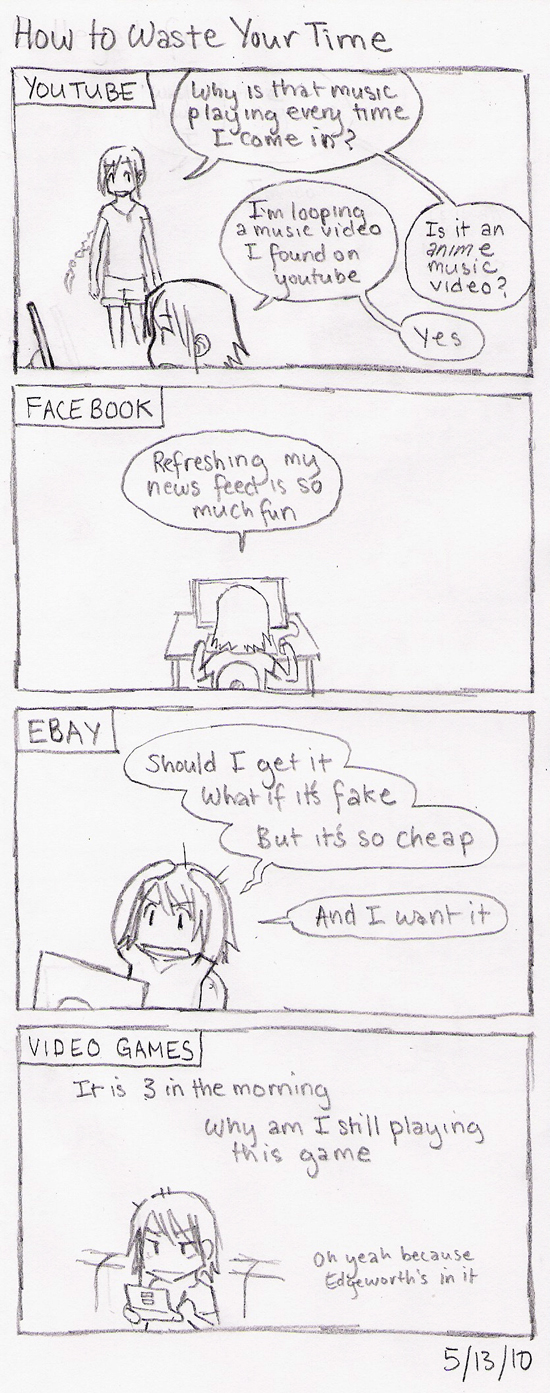How to Waste Your Time
May 13th, 2010When I saw the list of things we were to contrast and compare for class — Youtube, Facebook, eBay, and video games — I immediately thought, “Wow, those are all things that cause me to be unproductive.”
Okay, onto some paragraphs that might actually contribute towards a good grade.
Youtube is a place for users to share and consume content through video. Facebook and eBay are similar to Youtube in the sense that they all facilitate self-publishing; they differ in this respect only by what they are best suited to share — for Facebook, it’s social goings-on, for eBay, buy/sell advertisements, and for Youtube, video.
Facebook is a social networking site that is supposed to allow you to stay in touch with friends and family members, and to let you also display news about yourself to your friends. It has also become a major platform for advertisers and game developers.
Most Facebook games (at least, that’s what it seems like to me) let you know how well friends that also play the game are doing. The only Facebook game I actually ever played was D&D Tiny Adventures. It was pretty dumb — you made a character and could buy equipment for him or her, but to adventure, you clicked a dungeon, closed the window, and checked back every 10 minutes to read what had happened to you. No interactivity required. But some of my friends got into it, and, by golly, once I realized that Sally was a higher level than me, and I just had to beat her! Fortunately I got my sanity back, reminded myself of what was really important in life, and never played D&D Tiny Adventures again.
In this way Facebook has sort of turned into a “backwards” MMORPG. I say “backwards” because the social aspect, rather than the game aspect, is primary. The “game” is being interested in how your friends are progressing, and seeing if you can “beat” them.
eBay is a weird place and the last time I tried to buy something off of there I got two counterfeit copies of Pokemon Heart Gold and Soul Silver. It just goes to show how easily you can fake something on the internet. A fraudulent advertisement is not unlike a fake persona you create on Facebook or even on Youtube — anyone remember Lonelygirl15?
The video game in my comic is Ace Attorney Investigations, an awesome Nintendo DS game (by the way, Edgeworth is the studly-looking guy in the cravat and pink suit in the previous hyperlink). It’s a spin-off of the Ace Attorney/Gyakuten Saiban series, a collection of adventure/visual novel games that first came out for the Gameboy Advance. You’re a lawyer, and you get to shout “Objection!” in court. I actually can’t think of a way to tie this in to Facebook, Youtube, or eBay… except for the fact that you’ll find fan-made media for this series on all of those sites. I’m actually just writing about it because the Ace Attorney series contains some of my favorite games. It’s certainly a good way to waste time. 😀

 RSS
RSS






lol facebook and ds….lol
The ability to create fake personas is definitely a similarity that all four mediums have in common. It is impossible to know on the internet who you are actually “friend-ing” or talking to online. Video games are the ultimate fake persona, as you are able to become any character you desire and can act any way you want. I thought it was interesting how you mentioned that you received a fake product off of Ebay. Although these mediums seem to bring people together, I think you mentioned an important aspect, that it’s vital that people are weary about who they are interacting with when playing games and using certain websites.
I find it interesting how in your descriptions of Facebook and eBay, you brought up examples of your personal experience with them, and how those examples concerned video games. I suppose that’s another thing that all four of those properties (I never know what to call them when referring to them as a group – properties? Forms of media? What?) have in mind – that they can all be used to directly promote some sort of video game. Video games presumably promote themselves, eBay is a venue where video games can be sold, people can say “i love this video game” on Facebook or play spinoffs of those games on Facebook itself, as well as post videos about their favorite games on YouTube. Pretty interesting stuff, huh. Yet do all four properties, say, promote Facebook? How about YouTube or eBay? I’m inclined to think probably not, unless there’s a “Facebook: The Game! Stalk That Cute Guy/Gal!”
I like the point you made about Facebook games being more social features than gameplay. It says something when some Facebook games have pictures of people on your friend’s list playing the game and their level take up almost half the screen. Since Facebook games are free to play, Facebook game devs seem to want to increase the social aspect. Having other friends competing with you increases internet traffic to the game which helps advertisers. Also, there is a greater chance of you purchasing the virtual goods associated with that game.
I think you touched on an interesting point about the power of these four things to suck away time. It reminds me of when you have a bag of gross candy, and even though it’s not doing anything for you nutritionally and it doesn’t taste good, you eat all of it because, well, it’s there waiting to be eaten. I feel like this is how people interact with facebook, like in your comic, you just keep refreshing your newsfeed, even though nothing is really going on and you really don’t care that much, it’s something to do. I think this happens equally as often on youtube. I’d imagine a lot of people have watched a really long pointless video that was a link after a video they enjoyed and wondered why they didn’t stop watching half way through when they realized it wasn’t going to be good. In this sort of pointless procrastinating way, I’d say these four things aren’t so positive.
“Wow, those are all things that cause me to be unproductive.”
Good seed. Sometimes this sort of initial impression can be much more useful in analyzing things than the things which we derive after we get bogged down in the details – the intuitive “why” is often closer to our real conception than the one which we attempt to derive rationally. Or at least, it is often helpful when you want to reason out the more ephemeral aspects of a thing; a flat description of “what does it do” and “how does it work” is usually inadequate to describe real experiences.